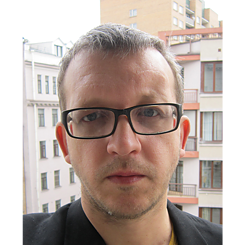Moscow
Oleg Nikiforov, Publisher
By Oleg Nikoforov
What would you say are symbols of your current situation or the current situation in your country?
The actual situation in Russia or rather Moscow, the city of 20 million people where I reside in, feels nothing like “catastrophic” yet it is nevertheless “alarming”. One thing remains unclear, if this “alarm” – announced on the city and the state level – is yet a “training alert” or already a “call for an action”. And what kind of “total mobilization” can come after all these preliminary measures of the “alert quarantine” will have been taken. Existenstially speaking it is exactly this indefiniteness that seems to be alarming here.Personally, the closest I can get to in my subjective perception of the standstill we are in now are the events of the “eventless” August Coup of 1991. When, after a declared preparative curfew in Moscow, the last Soviet officials' order to storm the “White house” was never given and the effective politics of bringing the country back onto the USSR’s track, didn’t come to pass. Thus because of thes absence or refuting of faith the collapse of the USSR followed in no time (officially it happened in the four month’s period, on the 26th of December, 1991). That day on the second day of the Coup, I returned to Moscow to continue with my studies at the 5th grade of the MGU’s philosophical department, which I entered back in 1987, a Perestroika year indeed, yet still a year of the “Soviet”). When I went to study philosophy, I did that because I wanted to personally clarify a question of effectiveness of the methods of “historical materialism”. Yet one problem I met encountered with there was that except for a couple of charismatic freaks at the faculty no one really believed in the effectiveness of the “historical materialism” even in MGU. There was neither certainty, nor faith nor even hope that the Soviet experiment at of actively changing the History had any future.
The eventless failure of the August Coup of 1991 just brought more evidence to what was already 'fait accomplie'. “We have no faith in you!” – that was exactly what was translating itself through the gathering together of many thousands of citizens for the purposes of the symbolic defense of the House of Soviets. The real and eventful drama came afterwards. It came with the collapse and fall of the USSR, accompanied by ad hoc (Fukuyama’s) declarations both of the End of History and of the End of “brief XXth century” only later to be followed by the events of “9/11” etc., refuting that hasty generalizations. The XXth century didn’t end then. To my mind the true end of the “Historical” XXth century is what we are closing on now – when we are entering the era of the COVID-19 pandemia. It is now that we are shifting into the “post-historic” space, getting ourselves involved with its global consequences that are hard to predict.
HOW WILL THE PANDEMIC CHANGE THE WORLD? What long-term effects can you make out already?
You already feel that changes are inevitable, that these changes will be profound and cross-cutting, but for now you can only guess what that can bewhat they might imply: definitely, they will put on trial the very concept of “Life” – in its social, socio-political, cultural aspects, in its key patterns and institutions. “Life” will have to get redefined and transformed as a “bio-political” (or “genetic-political”) entity, controlled and modified by some (deep-state, or trans-national, or subhuman) “Health and Life Maintenance Corporations”.In the meantime, the local “state”, i.e. the state “still-in-power”, is only but expressing its “deep concern with the problem”, which the state, being still a XXth century institution, for all its best intentions is not able to cope with. “Restriction of movement” – yes; “preparedness for tough quarantine measures” – yes; “urgent construction of new infectious diseases hospitals” – yes; “measures for social support of the population in a situation of inevitably subsequent economic recession” – yes; government support for local groups to participate in the SARS-CoV-2 worldwide vaccine development race –
Yes, yes, yes! – But... is that all one can do?
Oleg Nikiforov
“We have to do at least something!” – Therefore yesterday the streets of Moscow were subjected to preventive disinfection: batteries of irrigation machines diligently scattered “special disinfectants” along the roadway, sidewalks, parking lots and yards of the city. In some places, their efforts were complemented by private services of “preventive protection” with industrial vacuum cleaners. After all, even though little is clear to anyone now, washing their hands and streets will definitely not hurt anyone, will it?
What gives you hope?
“Where the danger is, also grows the saving power” (Friedrich Hölderlin). It remains to understand where, in what incarnations and implications this “danger” appears to us. And this “saving danger”, for me, is not in an immediate threat of death for our loved ones with a “weakened immune system”, for our “old people” who, first and foremost, are the forerunners of our memory and the bridges to History as “ours” – priceless value! – but this is our actual anxiety itself, that unites us – across all the borders, political, linguistic and age specific – with our "close, though distant" ones, on other continents and in neighboring houses and rooms.My hope is a new unity of humanity, despising its “yesterday's” Babylonian scattering, in our laughing at the formal distinctions of races, classes, nations and historical circumstances. Indeed, the challenging power, opposing the mankind now as COVID-19, does not recognize these differences, – and why should we?
